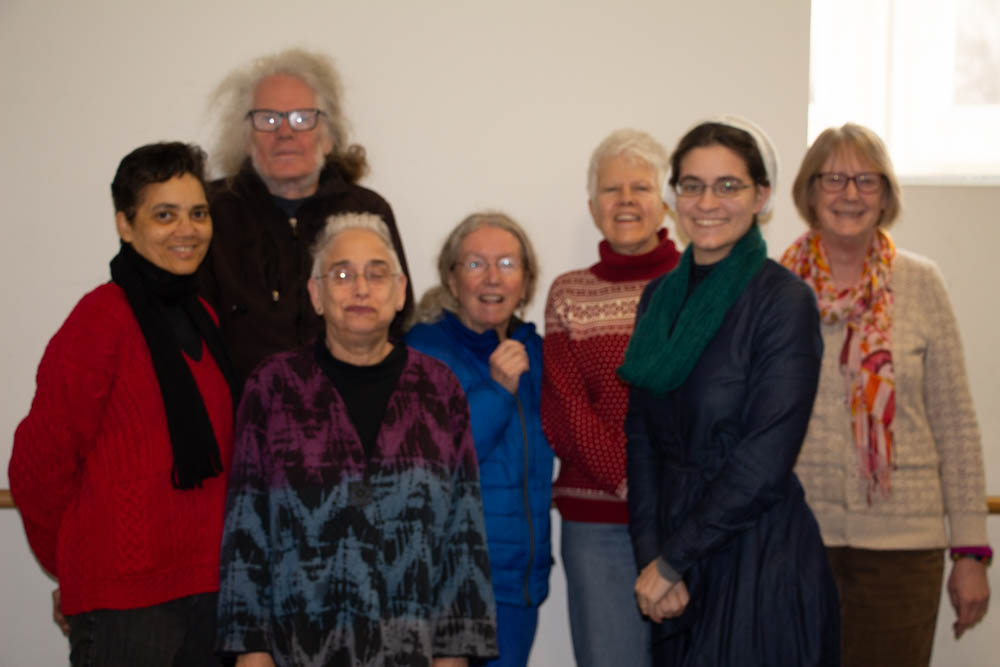Our Origins
When neighboring Adelphi Friends Meeting outgrew its meetingroom in the early 1990s, it was time to start another meeting. This is that new meeting. We are still what we call a “preparative meeting,” which is sort of like saying we haven’t quite left the nest yet. We are still formally attached to Adelphi Friends, in a caring relationship.
Our Beliefs & Values
The Society of Friends arose out of personal experience of God as revealed in Jesus Christ. The conviction that God can and does speak to all human conditions enabling, directing and working through us is at the center of Quaker faith and practice.
The Divine Spirit, which Friends variously call the Inner Light, the Inward Light, the Light of Truth, the Christ Within, That of God in Everyone, has power to reveal, to overcome evil, and to enable us to carry out God’s will. Quaker testimonies arise from listening to and obeying this Spirit.
Quaker faith welds the beliefs of its Christian foundation with the conviction that the Holy Spirit speaks to men and women and children of all races at all times. It draws individuals into a community of worship and of work for the redemption and improvement of human life.
Simplicity
Self-indulgent habits and luxurious living dull our awareness and make us insensitive to the needs of others and the leading of the Spirit. Ostentation and extravagant expenditure should not be a part of Friends’ lives. Friends should be particularly aware of this in planning marriages, funerals, social gatherings or public occasions. True simplicity does not consist of particular forms or the absence of grace, symmetry and beauty, but of avoiding over-indulgence, maintaining humility of spirit, and keeping material surroundings in proportion to human needs.
Peace
God’s law of love, as taught and lived by Jesus Christ, applies to all the levels of society. Wars break the law of love as do violence in communities and families and fighting between individuals. Friends have a settled intention to practice love and to make peace.
Integrity
Speaking the truth on all occasions has been a cardinal Quaker principle, and Friends believe the practice of taking oaths implies that a person might be telling lies on other occasions.
We advise the observance of care in speech and the use of only such statements as convey truth without exaggeration or omission of essential fact. Taking legal oaths implies a double standard of truthfulness and is contrary to the teaching of Jesus.
Community
We must be concerned about the welfare of every member of the Meeting community. While Friends need to guard against prying or invasion of privacy, it is nevertheless essential that Meetings be aware of the spiritual and material needs of members of the community.
Equality
We oppose all forms of prejudice. Prejudice should never be allowed to keep any person from a chance to develop or use their abilities, or deprive them of their political, economic, or social rights. We are called to work creatively for equal opportunity in education, employment, justice, housing, and the like.
Stewardship
Population growth and technological abuses are threatening the planet. Millions of people are malnourished or staving, unable to obtain food, homeless. Our faith that there is that of God in every person calls us to concern over this tragic situation. Friends are advised to set the example in living simply so that others may have the wherewithal to live. We are called also to work for public policy aimed toward conserving the world’s resources on one hand and sharing them fairly among all God’s children on the other.
(These explanations are all extracts from the Faith & Practice of Baltimore Yearly Meeting, the larger Quaker association to which we belong.)
“in the Gospel Order, God is calling individuals to live in covenant with Him and through that covenant in community with one another.“
– Lloyd Lee Wilson
Who We Are
Our Team & Leadership
Leadership is different among Quakers.
We have no paid staff. Instead, we are all expected to use our talents in whatever way we can.
Arthur David (the tall man in the group photo) is our presiding clerk. That means that when we gather for our monthly business meeting, he listens as we all seek Divine will. When he sees a path forward that honors all of our contributions, we are ready to move on to the next item of business.

F.A.Q.
Frequently Asked Questions
Why don’t you call yourself a “church”?
Quakers traditionally reserve the word “Church” for the worldwide body of all believers.
Does that bit about “equality” mean you are affirming of the LGBTQIA+ community?
Absolutely! We welcome your participation in all aspects of the Meeting community, regardless of sexual orientation, gender identity, or gender expression.
What do you believe about the role of women?
Quakers have believed in spiritual equality across gender lines since our earliest days. Women give messages during meeting for worship, and our community has had clerks of several genders before.
Why do you call it “meeting for worship”?
Well, that’s what we’re doing, isn’t it? We’re meeting together, with the intent to worship.
Why do you sometimes call yourselves “Friends” and other times “Quakers”?
The official name for our denomination is the Religious Society of Friends. We get the word “friends” from Jesus’ statement in John 15:15 that we are his friends because we know his business.
We’ve had the nickname “Quakers” almost as long as we’ve existed. The story is that a judge got fed up at George Fox not seeming to be scared of him. Fox told him he only quakes before God. So, the judge declared him a “quaker.”
